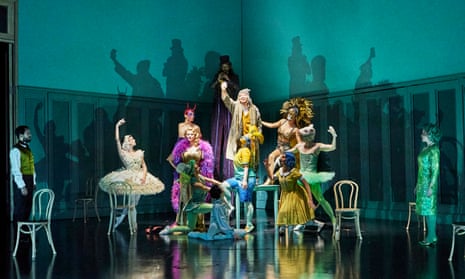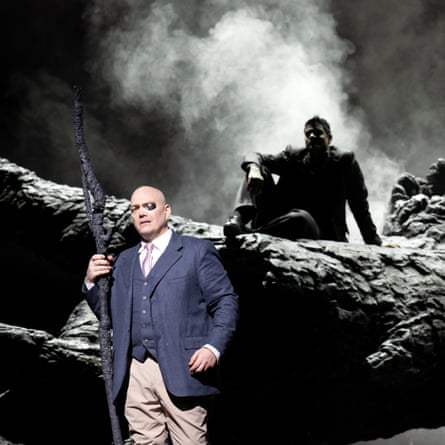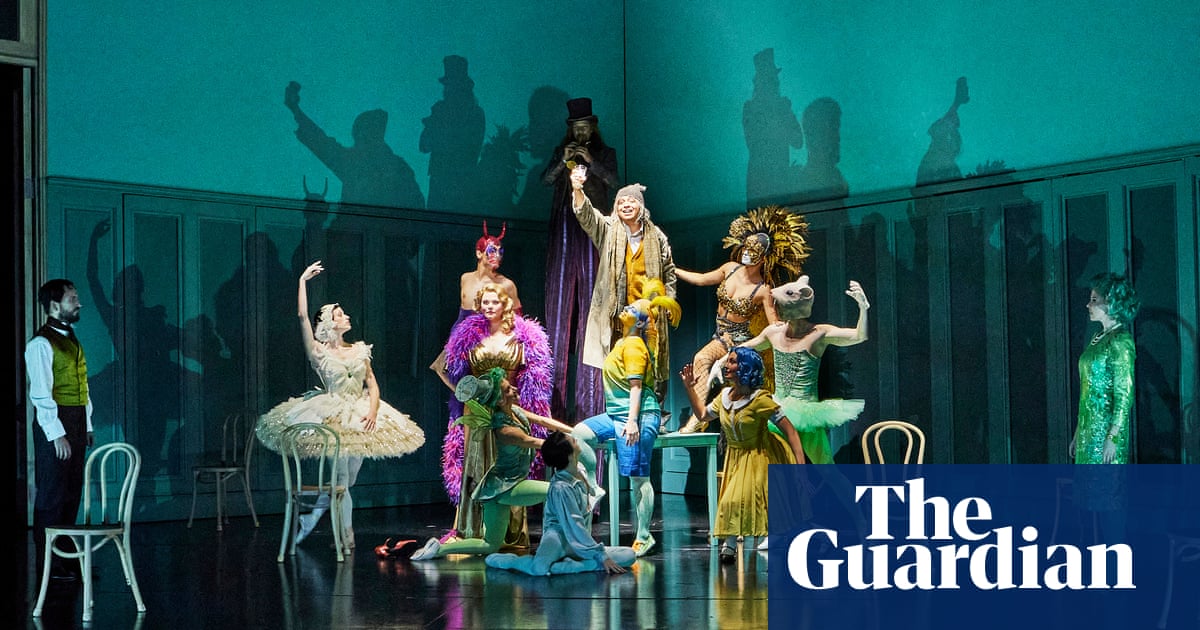
Royal Ballet and Opera announces ambitious new season – and name change
2024-25 programme includes premieres of Mark-Anthony Turnage’s opera Festen and Wayne McGregor’s Margaret Atwood ballet MaddAddam
Eight new productions, a world premiere, a European premiere – and a name change: the Royal Ballet and Opera, as it is now to be known, announced on Tuesday an ambitious programme across the main and the Linbury stages for the 2024-25 season.
The world premiere will be Mark-Anthony Turnage’s opera Festen based on Thomas Vinterberg’s cult 1998 film, which also became a successful stage play. Lee Hall has written the libretto, Richard Jones will direct, Edward Gardner conducts and the cast includes Allan Clayton, Eva-Maria Westbroek and Gerald Finley. Other new opera productions include Ted Huffman (who previously directed an acclaimed 2016 staging of Philip Venables’ 4.48: Psychosis) making his main stage debut with Tchaikovsky’s Eugene Onegin; Offenbach’s the Tales of Hoffman directed by Damiano Michieletto (a co-production which debuted in Sydney last year); and a Leonard Bernstein double bill, marking the first time his two short operas Trouble in Tahiti and A Quiet Place have been staged at Covent Garden.

Barrie Kosky’s Ring Cycle continues with the second opera of the tetralogy, Die Walküre. Antonio Pappano conducts, Christopher Maltman returns as Wotan, Lise Davidsen sings the role of Siegline and Elisabet Strid, Brünnhilde. Pappano’s tenure as music director comes to a close at the end of the current 23/24 season, Jakub Hrůša does not take over until September 2025, but the Czech conductor will also be at the house this coming season, conducting a revival of Claus Guth’s Olivier-winning staging of Jenůfa. Principal guest conductor-designate Speranza Scappucci leads her first main stage production: Richard Jones’s La Bohème, while this year’s Puccini anniversary is further marked by revivals of Jonathan Kent’s Tosca (conducted by Eun Sun Kim, in her house debut), and Andrei Serban’s classic staging of Turandot, conducted by Rafael Payare with Sondra Radvanovsky and Ewa Plonka sharing the title role.
The Royal Ballet will present the European premiere of Wayne McGregor’s MaddAddam, based on Margaret Atwood’s trilogy of novels (Oryx and Crake, The Year of the Flood and MaddAddam) with a specially commissioned score by Max Richter. The return of Kenneth MacMillan’s Romeo and Juliet marks its 60th anniversary; also 60 years old is John Cranko’s take on Pushkin’s Onegin which will be on the main stage only a few months after its operatic counterpart. New work will be presented by choreographers including Christopher Wheeldon, Joseph Toonga, Kyle Abraham and Crystal Pite. A George Balanchine triple bill will celebrate the leading US choreographer born 120 years ago.
Christmas offerings include Frederick Ashton’s effervescent Cinderella and Antony McDonald’s colourful staging of Humperdinck’s Hansel and Gretel.

Royal Ballet and Opera chief executive Alex Beard acknowledged the challenging times for performing arts and opera particularly, with many companies forced to make cuts, changes or even close due to loss of public funding. “We suffered our own cuts – 10% in Arts Council funding, and the economic pressures we feel are no different to those felt by others,” he said. “[But] in that context it’s so important to put a confident foot forward and invest in the future of the art form.”
He was cautiously hopeful that the troubled English National Opera would continue to be a presence in the capital. “Of course we need a second opera company here. Multiple voices are really important,” he said, pointing to the flourishing opera scenes in cities such as Paris and Berlin, both home to several opera companies.
The average age of the Covent Garden audience has gone down from 52 to 48 over the past five years he said, opera goers aged between 20 and 29 have more than doubled, ballet audiences have seen an increase of almost the same amount.
“In a fragmented world where so much of people’s cultural life is mediated digitally we bring people together in one shared space to reflect on the bits of life that really matter, and we do so with unrivalled force. What’s enormously encouraging is how that resonates. With not just our longstanding members but also the next generation of ballet and opera goers” said Beard.
More than 100,000 people have signed up for the Young ROH scheme which allows 16 to 25-year-olds to purchase tickets at £30 for midweek performances. Friday Rush seats are also released each week, offering last-minute and reduced price tickets. Ticket prices range from £3 in the Linbury, £4 for main stage ballet programmes and £8 for operas, to £340 for those wanting the best seats in the house for Die Walküre.
The evolution of the overall name sees the two companies whose home is the Royal Opera House unite in what Beard describes as “a massively overdue change”. “The Royal Opera House”, as the company was previously known, did not make clear that the Royal Ballet and the Royal Opera companies were part of the same organisation, Beard said.
“Our name now describes the whole span of what we do,” he said, adding that it reflects the fact that the ROH is only one of many places where the company’s work is now experienced. Beard pointed to their ever expanding learning programme that currently works in 1,500 schools reaching 40,000 children, while this upcoming season, 11 productions will be in 1,500 cinemas across the world.

Brexit is adding expense and layers of bureaucracy he said, but has not prevented them attracting the artists they want. “The visa regime is much much more difficult if you’re an individual or an orchestra performing or touring in Europe, which is damaging the ecology as a whole”, but he applauded the extension of theatre tax relief in the last budget – “an enormous help”.
“I do think that after a while of the arts not being centre stage, both parties are appreciating the value they can bring,” he said, adding that he is having conversations with the Labour shadow culture team and, should they be in power by the end of the year, he would look forward to working with them, noting that at March’s Labour Creatives launch “Keir Starmer spoke with passionate authenticity about how much music matters to him”.
He said he was often asked to name his favourite opera or ballet. Impossible – “but I can tell you what my favourite sound is. It is when a school group come into the auditorium for the very first time as part of a schools matinee and you can hear that collective ‘Aaaah’ – the intake of breath when they realise they’ve crossed the threshold into this incredible portal, and the end where they just go nuts, whether Swan Lake or Magic Flute, these are works that can speak to people with extraordinary force and directness.”
General booking for the 2024-25 season opens on Wednesday 10 July.

